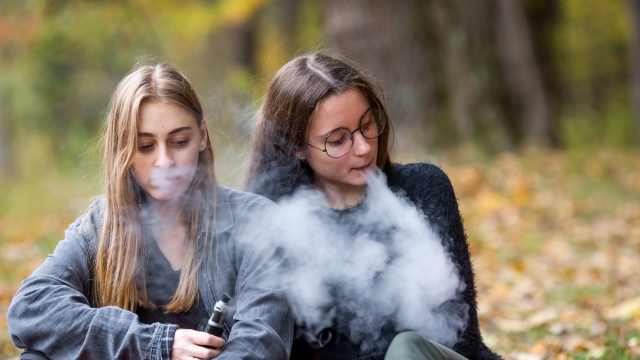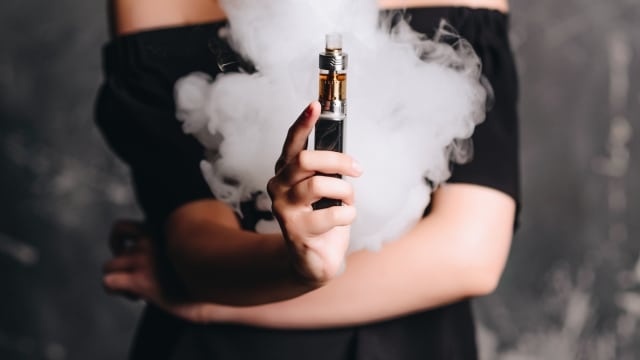Over the past few years, vaping cannabis, e-cigarettes, and nicotine products have become incredibly popular in the United States. And this fact raises an important question concerning the right vaping age. Additionally, this surge in the popularity of vape pens and tobacco products has sparked concerns about age restrictions, especially considering the ongoing issue of teen vaping.
According to Federal Law, you must be of legal age, 21 years old, to be legally able to buy vapes. If the vape laws are violated, both the buyer and the seller of vapor products can face consequences due to their actions.
And so, in this comprehensive guide, we’ll delve into several crucial aspects. First, we’ll cover topics such as the required legal age to buy vape pens, e-cigarettes, and tobacco products and the reasons behind age limits. Next, we’ll explore how enforcement mechanisms function and examine potential penalties for breaking the vaping laws. Finally, we’ll examine how the United States regulates vaping and compare it to other countries.
Overview on How Old Do You Have to Be to Buy Vapes
The growing trend of teen vaping has resulted in elementary and secondary schools, college campuses, and public and charter schools struggling to regulate access to vapor products.
Moreover, as the habit becomes more common, it’s crucial for the public to fully grasp the vaping age limit rules for purchasing e-cigarettes, vape pens, and nicotine products. However, though federal law states that the legal vaping age to buy tobacco and vapor products is 21, eight states, including Rhode Island, South Carolina, and West Virginia, allow teen vaping at 18 years old.
Furthermore, even if there’s a ban on e-cigarettes, tobacco products, and vape pens in some places, a vaper can still find a designated smoking area. As a matter of fact, there are designated smoking areas in indoor buildings, universities, school property, state park buildings, state college campuses, public school grounds, highway rest areas, government buildings, and correctional facilities.
But of course, the fact remains that nicotine products, electronic cigarettes, and vape pens lead to mental illness. And if the vaping laws are abused, or the minimum age is not met, teens may end up in youth development centers or juvenile corrections facilities.
The Popularity and Prevalence of Vaping Among Different Age Groups
Vaping has gained popularity across diverse age groups. In light of the widespread usage of vape pens, carts, and e-cigarettes, discussions have emerged concerning the impacts of vape devices and tobacco products on health and society. As a result, the findings lead to conversations about instituting and defining a minimum legal vaping age.
Moreover, it’s crucial to understand the allure vapor products hold and their potential risks. And, of course, this understanding will play a pivotal role in shaping comprehensive public health strategies and informative awareness campaigns.
In many cases, teens at a young age vape because they think it’s cool, and they’re drawn to the flavors of e-cigarettes and cannabis. Additionally, some may perceive vaping and smoking tobacco as a way to relax or manage stress. However, it’s important to note that vaping also carries health risks, including potential addiction and unknown long-term effects.
Furthermore, to ensure that individuals meet the required minimum age to buy vape pens, e-cigarettes, and tobacco products, age verification and enforcement procedures are implemented. Plus, there are facilities licensed to employ these measures for in-person and online vape transactions.
Hopefully, through the execution of vape laws and age limits, along with the help of healthcare facilities and emergency medical providers, teens will quit smoking vape products and proceed to treat addiction recovery.
Legal Vaping Age in the United States
In the United States, regulations concerning the purchase of vape products are governed by both federal and state authorities. At the federal level, the minimum age is set at 21. However, across individual states, varying rules come into play, influencing how retailers sell vaping products to customers of different age groups.
This complex landscape of regulations aims to address the youth vaping epidemic in the country. Plus, it aims to protect young people from the harmful effects of nicotine on brain development, especially in child and healthcare businesses.
Moreover, it’s important to know that there are vaping laws in place concerning the legal age to vape e-cigarettes, tobacco products, and other vapor products. States like Rhode Island, South Carolina, and West Virginia have implemented a legal age to vape at 18. On the other hand, vaping laws in 41 states strictly follow the minimum age of 21 years old.
Federal Regulations
The Tobacco 21 law, enacted in the United States, establishes the minimum age for the acquisition of vapor products like e-cigarettes and vapes at 21 years old. And this also covers food service employees and licensed daycare facility workers who may be exposed to vapors of vape pens, tobacco products, or e-cigarettes in their workplace.
This federal law was established due to concerns about the potential dangers associated with vaping. And these concerns were especially heightened by the emergence of a puzzling vape-related lung illness known as EVALI. However, despite the implementation of the Tobacco 21 law and other vaping age laws, teen vaping remains a prevalent issue in the US, particularly in schools.
Furthermore, federal vape laws must be adhered to in all states. This includes those related to electronic smoking devices, equipment sterilization rooms, public or daycare facilities, and child and healthcare businesses.
State Variations
Across various states, there can be additional age limit regulations pertaining to purchasing vape products, often classified as tobacco items. For instance, consider Virginia, where vaping isn’t regarded as tobacco use.
Nevertheless, it’s advisable to exercise caution when using tobacco products in childcare facilities, assisted living residences, school property, public educational building grounds, and criminal justice facilities.
More importantly, note that procuring e-cigarettes, vape pens, and tobacco products requires adhering to your state’s vaping age limitations and regulations.
Rationale Behind Age Restrictions
There’s a minimum age for purchasing vape products to protect young people from the potential health hazards associated with e-cigarettes, vape pens, and tobacco products. They include nicotine dependence and negative brain development.
So, by implementing and enforcing age limit restrictions, the federal and state governments aim to ensure the safety and security of minors. More importantly, prevent them from purchasing and using e-cigarettes, vape pens, tobacco products, and other vapor products.
Youth Vaping Epidemic
With the sharp rise in vaping among young people, the necessity for stricter regulations and age limit rules to ensure their safety has become evident. Looking back to 2019, the US grappled with a concerning underage vaping epidemic. Back then, about 28% of high school students were experimenting with e-cigarettes and vape pens.
And so, as a proactive measure, the Tobacco 21 law was introduced. Its primary aim was to address the pressing issue and curtail the prevalence of teen vaping throughout the nation.
However, despite all these measures in place, teen vaping remains a significant challenge, particularly within school environments. Additionally, ensuring the rigorous enforcement of the age limit becomes crucial in the ongoing battle against this escalating issue. Plus, this enforcement plays a pivotal role in safeguarding young individuals from the potential risks linked to nicotine exposure.
Nicotine and Brain Development
Exposure to nicotine during the teenage years has been linked to enduring changes in brain development. These changes encompass shifts in brain structure, heightened impulsivity, and decreased cognitive abilities.
Moreover, this situation raises particular concern since young individuals are particularly prone to nicotine addiction. This is attributed to the ongoing maturation of their brains during this pivotal life stage. That’s why the legal age to vape is essential in preventing minors from accessing e-cigarettes and tobacco products.
Also read
How Do Vapes Work? A Comprehensive Guide to Vaporization
Age Verification and Enforcement
Age verification and enforcement are crucial to guarantee that only individuals of legal adult age can purchase vape products like e-cigarettes. And it must occur in both in-person retail purchases and online vape sales.
This is precisely why retailers must verify the age of their customers. Those who are found to be below the minimum age to buy a vape can face penalties as a consequence.
In-Person Retail Purchases
Retailers need to request a valid ID from customers to verify their age when making in-person purchases. The acceptable forms of identification include driver’s licenses, state IDs, and passports.
As per the FDA, individuals under 27 must present a photo ID when buying vape pens, tobacco products, and e-cigarettes in person. Retailers who fail to adhere to the age limit law may incur fines, license suspension, or criminal charges.
Online Vape Sales
Retailers must implement an age verification system to confirm that customers meet the necessary age criteria when making online purchases. And this involves customers sharing personal information such as their name, address, and birthdate.
Moreover, in the case of online vape shops and head shops, it’s a mandated obligation to integrate a third-party age verification service into the checkout process. This step guarantees that customers meet the legal minimum age for purchasing vapes online.
Penalties for Violating Age Restrictions
Violating the legal vaping age law for vaping products has serious implications for retailers and underage buyers.
Legal Consequences for Retailers
If retailers sell vape products to underage customers, they could potentially face fines, penalties, and even the jeopardy of losing their licenses. And the repercussions for disregarding the vaping age limitations can vary depending on the location and circumstances.
Furthermore, to circumvent these legal challenges and establish an accountable retail environment for e-cigarettes, vape pens, and other vaping product sales, it’s imperative to adhere meticulously to the age limit law.
Penalties for Underage Purchasers
In the event that individuals who are not permitted to buy a vape are discovered purchasing or possessing vape products, they may potentially encounter fines, community service, or other applicable penalties.
The underlying aim of these repercussions is to dissuade young people from attempting to acquire vape pens, e-cigarettes, and tobacco products through unauthorized channels. Consequently, this action effectively highlights the critical importance of adhering to the regulations surrounding vaping age.
International Comparisons
The regulations on vaping age for purchasing vape products like e-cigarettes vary worldwide. In fact, some nations impose more stringent measures than others.
By delving into how different countries approach and enforce their age limits, we can extract valuable insights on effectively curbing young people’s access to vape products. Plus, we can shield them from the potential dangers of nicotine exposure.
Contrasting Age Restrictions Worldwide
Across the globe, different countries establish various age limits for purchasing vape products like e-cigarettes and vape pens. And the restrictions span from 18 to 21 years old.
To illustrate, Australia mandates an age of 18 for nicotine-free e-cigarettes, whereas Ethiopia enforces a minimum age of 21. Similarly, Canada’s vaping age varies from 18 to 19, and it’s set at 20 in Japan.
These variations serve to highlight the diverse approaches nations take to combat underage access to vaping items and address the potential health risks associated with their usage.
Learning from Different Approaches
By examining how various age limits function on a global scale, we can gain insights that steer future policy decisions and refine strategies to prevent youth from accessing e-cigarettes, vape pens, and tobacco products.
Note that nations with lower age limit policies might experience elevated rates of underage vaping. On the other hand, those enforcing stricter regulations could witness a decline in teen vaping.
And so, through comprehending the methods adopted by different countries and their impact on underage vaping, policymakers and retailers can implement more effective measures. This, in turn, ensures age-appropriate access to vaping products like e-cigarettes and vape pens. Plus, it safeguards young adults from potential nicotine exposure risks.
Final Takeaway – How Old Do You Have to Be to Buy Vapes
Federally, the legal age to buy vapes in the US is 21. However, there are state variations, with some allowing vaping at 18. However, despite regulations, the challenge of teen vaping persists, necessitating age verification.
Moreover, international comparisons reveal diverse approaches guiding policy decisions to prevent underage vaping.
Related Questions
Still have questions? Check out a couple of common ones below.
What are the eight states that allow the 18-year-old crowd to vape?
In 2023, the states that set the age limit at 18 for vaping are Rhode Island, Kansas, Missouri, Montana, North Carolina, South Carolina, West Virginia, and Wisconsin.
Can I vape at work?
Vaping is generally banned inside residential treatment facilities, enclosed public spaces, active military bases, and commercial enclosed indoor spaces. But your workplace may have designated smoking areas for e-cigarettes and vape pens.
Furthermore, bosses of childcare employees banned them from using vaping devices.







